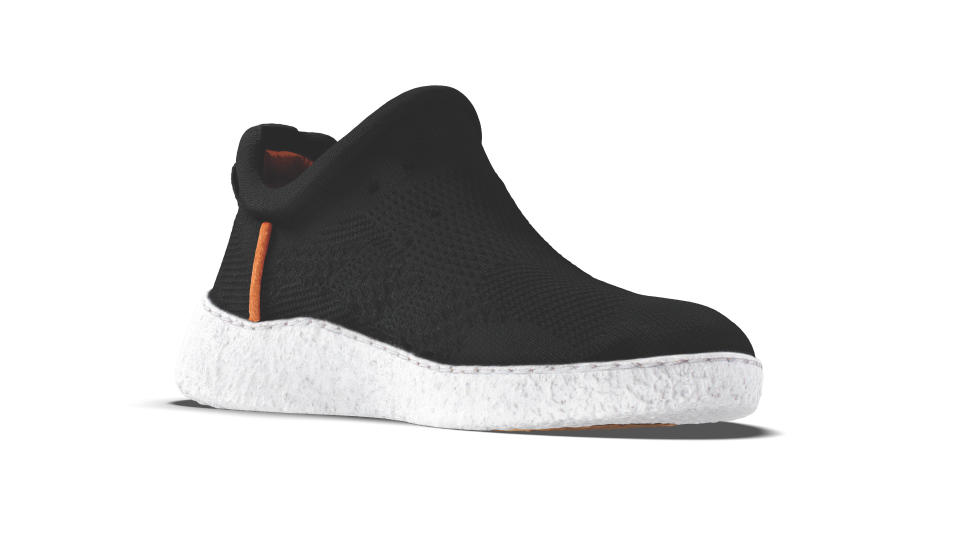Philippe Starck’s New Sustainable Sneaker
- Oops!Something went wrong.Please try again later.

PARIS — Philippe Starck is concerned about lowering fashion’s environmental footprint. So he’s taken on the challenge of shoes, launching a limited-edition, AI-enhanced and fully recyclable sneaker with Baliston.
“Shoes are very ‘fashionable,’ and fashion changes a minimum of one time a year — and that ends with millions and millions of pairs of shoes in the garbage. I was not really interested in that,” Starck told WWD.
More from WWD
The Baliston by Starck sneaker is made with only five materials: castor bean yarn, sugarcane, organic cotton, natural rubber and recycled plastic — so that the components can be separated and recycled. Customers send their pair back to Baliston’s Denver facility, where it’s torn down to its raw materials, recycled and reused in the next Baliston collection.
The shoe uses AI sensors to analyze a customer’s gait and create individualized insoles to help users improve posture.
The “very precise goals” of making a truly sustainable shoe while contributing to a customer’s wellness are what brought Starck into the project, but keeping within the parameters was one of the biggest design challenges he has faced during his storied career.
He started by designing a full collection, but had to narrow it down to keep the shoe to five components. Then he’d request certain colors or finishes, but was told it was not possible with the limited textiles that fit the bill. To achieve the parameters of the textiles, he opted for a sleek, timeless style that can be worn for many years.

“I’m sort of a dynamic design director, but in this I was obliged to restrain myself and say, ‘No, this is too much,’ but add enough to not be boring. At times it was not fun, but it was super interesting,” he said of having to think of new ways to approach the rigorous requirements. “That’s why this is not about the shoes. It’s about something bigger than the shoes.”
Up until now, designers in all disciplines have had the choice to use sustainable materials and make their items recyclable. But that time has passed, Starck said.
“Now it’s not a question, it’s obliged. We need moral companies, we need ethical companies,” he said, adding that designers shouldn’t work on projects or partner with companies that work on damaging projects even in other industries, and have a responsibility to look into parent companies or backers that own them.
He wants to encourage other creatives in all aspects of design, and particularly the fashion industry, to rethink their processes.
“We know that the world is small, and we cannot continue to dig, consume and put in the garbage. It’s impossible. That’s why for me, elegance is longevity. In the end, it’s more intelligent.”
Starck spoke as an on-trend “de-influencer,” joking that even if you go into a store and see the most beautiful chair of his own design, it’s OK to take a pass. “Stop and say, ‘do I need it?’ If you don’t, don’t buy it. Eighty percent of the time it will be ‘no,’ and it’s a simple change to make.”
Developing the shoes required years of research. It was a three-year design process for Starck, and an eight-year process for Baliston founder Karim Oumnia to develop the sensory tech through his company Digitsole.
In addition to the gait analysis and custom insoles, the sensors monitor the state of the shoe and notify the user when it’s time for a new pair. Using a subscription model, the customer receives a replacement shoe and can send back their old pair for free.
If AI shoes seem a little far-fetched, Starck is positive about the use of AI to create more efficient solutions.
“Today all the problems we have all come from a flat step in our curve of evolution,” he said. Humanity is stuck in crisis. “We need help, and we need to have it coming from something a lot more intelligent than us, because we have in front of us a lot of problems we are not able to solve,” he said, citing non-extractive energy alternatives as something AI could tackle.
He also ties it back to the Baliston shoe, noting that with the current AI` tech analyzing someone’s gait, he sees the next iteration being a completely bespoke shoe. Starck also wants to work on 3D-printed shoes, so that people can reduce waste.
“I’m 100 percent convinced this will happen, and it will happen quickly,” noting the positive prospects of tech, adding: “The way you are using AI makes a difference.”
“Technology is the tool to improve sustainability,” added Oumnia.
“It’s a huge commitment from us to say everything we produce we are responsible for, and we will take care of it,” he said, noting the scale of what the clothing and footwear industry contributes to landfill. “Can you imagine if even 10 percent of the industry today would do the same?”
Best of WWD

